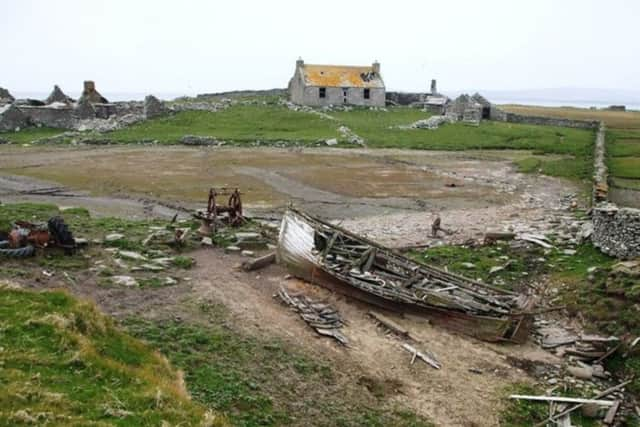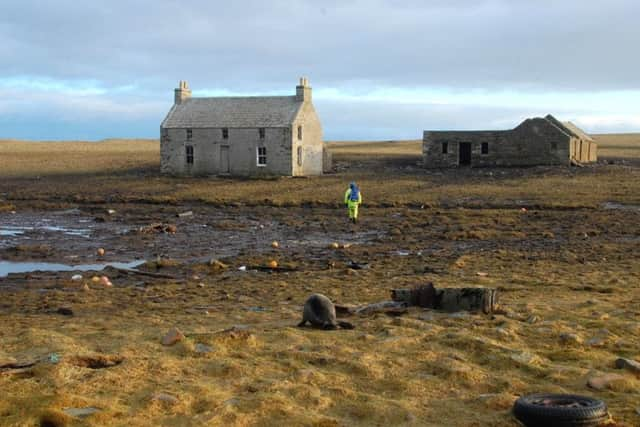An abandoned Scottish island and the last family to call it home
Swona, in the Orkney Isles, was last inhabited more than 40 years ago. Since at least the early 1930s, just one family - the Rosies - called it home with the last brother and sister sailing off for the final time in 1974.
It is believed that the elderly pair only left for a short time to stay with relatives on South Ronaldsay, but they were never to return as ill health took hold.


Advertisement
Hide AdAdvertisement
Hide AdToday, only a herd of feral cattle can be found on the island in the Pentland Firth, which sits around seven miles north of John o’ Groats.
Swona was one described by a newspaper - the Press and Journal - as “surely one of the queerest places of residence” in the British Isles given the isolation of its residents.
But its loneliness has been Swona’s selling point over time.


When the island went on the market in 1936, it was touted as the perfect safe haven from the dangers of war.
The sale attracted several interested parties - including a heartbroken Indian prince.
Raj Kumar Prafulla Kunar Banjude, 32, was among those looking to buy the island as he sought a place of peace and refuge following the death of his beautiful young wife.
Humans lived on Swona since around 500BC with the Vikings among those who settled here. By the mid-18th Century it was home to nine families. In the 1880s, 47 residents lived on the island, which had its own school until 1920.
Living conditions were naturally harsh, however. Frequently cut off by the swift tides of the Pentland Firth, the coastline claimed the lives of multiple mariners over the years. A bank of reef to its west side was a notorious danger spot.
Advertisement
Hide AdAdvertisement
Hide AdBy 1937, it was just James Rosie and his children, James, Arthur, Edith, Violet and Eva - aged between 19 and 30 - who lived on the island.
“They still stay on, contented with their lot,” reported the Press and Journal.
“They inhabit a blue-stoned, house of two storeys, over which the sea spray dashes in winter, and maintain themselves by tilling the soil and by lobster fishing.
“There are no horses on Swona, the ploughs being drawn in primitive fashion by pairs oxen,” the article added.
The Rosie family raised crops of black oats, bere, turnips and potatoes. Eggs from their 300 chickens were sent by motor boat to South Ronaldsay for market, along with occasional cattle and sheep.
James Rosie built his own motorboats using car engines bought from the mainland. An oil engine drove the mill which ground his corn, according to the article.
Once a week, newspapers and mail were delivered from South Ronaldsay. The battery for the family’s wireless radio was charged by a windmill and dynamo, which also occasionally supplied electric light for the house.
Mr Rosie as a “stalwart man with the keen blue eyes of a seaman and a pleasant soft-spoken voice” spoke of the attractions of living on the island.
Advertisement
Hide AdAdvertisement
Hide AdHe said: “Out there we’ve no such thing as unemployment. We’ve always plenty to do and we’re as well there as anywhere else.’
“It’s no use grumbling, and we consider ourselves lucky in many ways. I once read newspaper of people being lonely London.
“Now, what can you make that? Everyone’s rushing about in these big cities and your life is in danger every minute.”
Asked if his family did not feel the urge to go to the mainland, Mr Rosie said: “Well, so far I’ve heard no complaints. It never seems to worry them. They go to the mainland for holiday in turn every now and then.
“Holidays I daresay we could leave Swona if we liked, but we don’t want to go.”
Today, Swona is owned by two Orcadian farmers but the land is not worked given it is so hard to reach, it is understood.
It’s human abandonment has led to many natural riches, however, with the island a Site of Special Scientific Interest where a number of rare plants can be found.
